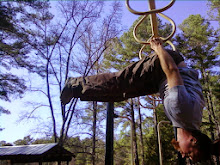"When things go wrong as they sometimes will,
When the road you're trudging seems all up hill,
When the funds are low and the debts are high
And you want to smile, but you have to sigh,
When care is pressing you down a bit,
Rest if you must, but don't you quit.
Life is queer with its twists and turns,
As every one of us sometimes learns,
And many a failure turns about
When he might have won had he stuck it out;
Don't give up though the pace seems slow--
You may succeed with another blow,
Success is failure turned inside out--
The silver tint of the clouds of doubt,
And you never can tell how close you are,
It may be near when it seems so far;
So stick to the fight when you're hardest hit--
It's when things seem worst that you must not quit."
~ Unknown AuthorI apologize for the delay in posts. Recently, my wife was diagnosed with Hodkin's Lymphoma. Yes it is treatable, but as one person told me, "no mistake about it, it is cancer."
So over the last few weeks, we've been finding out what it was that was making her feel so crappy and lose weight unwillingly, coming to grips with the diagnosis, and finally how to beat the hell out of it.
One thing's for sure, the next time my client says that an exercise is 'too hard' or 'I don't want to try it' or simply 'I don't want to', they'll get a healthy dose of motivation due to my wife's bout with cancer...she WISHES she had the energy to do a certain lift, or move, or bike ride, etc.
I'm back with a vengeance.

 The above photo is taken from the Cooper Canyons by a fellow that ran the trails with the Tarahumara, and was featured in the book Born to Run, by Christopher McDougall.
The above photo is taken from the Cooper Canyons by a fellow that ran the trails with the Tarahumara, and was featured in the book Born to Run, by Christopher McDougall..jpg)



